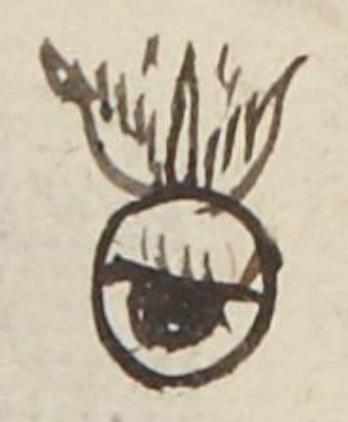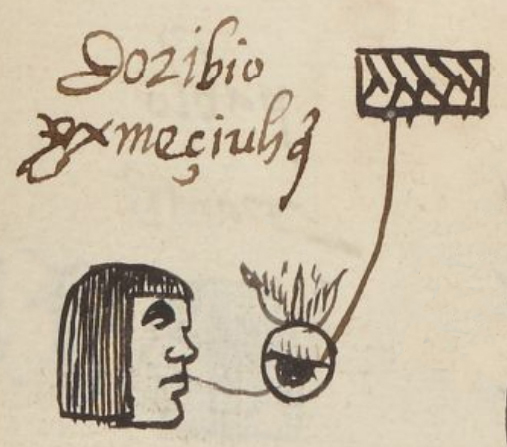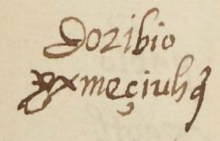Ixmeciuhqui (MH500r)
This black-line drawing of the compound glyph for the personal name Ixmeciuhqui (which is a person of the Ixmeciuhca ethnicity), is here, associated with a man. The glyph includes two phonetic indicators, an eye (ixtli) and a maguey plant (metl), which provide the start to the name. The maguey has three branches. The eye is largely the traditional stellar or starry eye that doubles as a star, but it has added eyelashes.
Stephanie Wood
For information about the Ixmeciuhca, see for example, Luis Reyes García, Cuauhtinchan del siglo XII al XVI (1988), 117.
See below for examples of the stellar eye from the Codex Mendoza (probably 1540s) and the eyes in the Matrícula de Huexotzinco (ca. 1560), which are evolving toward European stylistics.
This is a personal name, preceded in the gloss by a Christian first name (Toribio). He may have been named after Toribio de Benavente, also known as Motolinia ("One Who is Poor or Afflicted"). This was the first word he learned in Nahuatl, and he went on to learn the language well. He lived in the monastery in Huejotzingo. Doing a quick search for the name "Toribio" will produce an impressive result.
Stephanie Wood
doribio
yxmeçiuhq~
Toribio Ixmeciuhqui
Stephanie Wood
1560
Jeff Haskett-Wood and Stephanie Wood
eyes, ojos, magueyes, etnicidades, ethnicities

ix(tli), eye, face, https://nahuatl.wired-humanities.org/content/ixtli
me(tl), maguey agave plant, https://nahuatl.wired-humanities.org/content/metl
Matrícula de Huexotzinco, folio 500r, World Digital Library, https://www.loc.gov/resource/gdcwdl.wdl_15282/?sp=79&st=image
This manuscript is hosted by the Library of Congress and the World Digital Library; used here with the Creative Commons, “Attribution-NonCommercial-ShareAlike 3.0 License” (CC-BY-NC-SAq 3.0).







